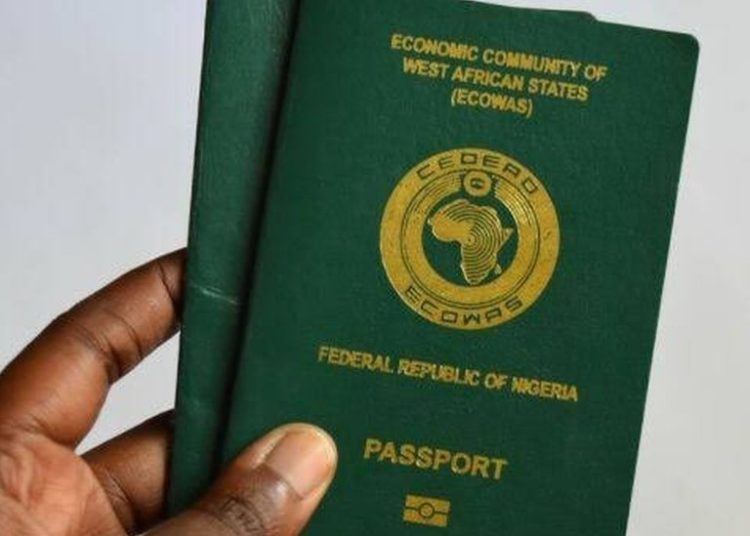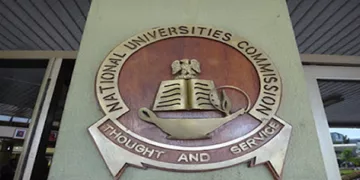Thousands of Nigerians in Diaspora and locally have applied, paid, and been captured but are yet to be issued their international passport booklets, along with foreign visitors seeking visas, continue to groan about the difficulties associated with the process, findings by LEADERSHIP Sunday reveal.
This scarcity of booklets has been blamed the failure of the federal government to grant a window to the Nigeria Immigration Service to utilise part of the revenue generated in dollars and currencies from foreign embassies.
Worried by the scarcity, which they fear might last longer than envisaged , the Nigeria Immigration Service (NIS) now patronises operators of Bureaux De Change for forex to foot it bills and thus, produce the all important travel documents, in line with its mandate.
Officially though, NIS denied turning to bureaux de change. The spokesperson of the service, Amos Okpu, said, “NIS is a government agency, it can’t patronise bureaux de change for any forex transactions whatsoever.
“Remember that CBN monitors all transactions by government agencies including NIS. Moreover, the TSA policy certainly cannot allow such transactions for any government agency.” He concluded.
LEADERSHIP Sunday however gathered that the shortage of passport booklets which many users believe has come to stay, is due to the foreign exchange policy of the Central Bank of Nigeria’s (CBN) as it affects the Nigeria Immigration Service (NIS).
Top sources at the ministry of interior and at the Immigration Service who pleaded not to be named, revealed that despite generating billions of naira through passports and visas issuance at its embassies, the federal government has failed to grant the NIS a window to utilise part of the revenue its generates from these embassies to boost production of booklets, thereby leaving the service to source for funds elsewhere.
They revealed that, ‘The NIS is handicapped. As it stands, it’s the local that takes care of the operations in the diaspora. The CBN is not giving the NIS a window to foreign exchange. Monies paid in embassies go straight to the CBN, with NIS getting nothing, except from its budgetary allocations. So, the company supplying the booklets goes to bureaux de change to buy foreign currencies for passports. It goes to bureau de change to buy dollars and meanwhile, NIS has not increased the price. So, it will eat into NIS revenue, because the printers will bring their bill and NIS has to pay them.
According to these sources who however, acknowledged that there are several challenges associated with issuance of Nigerian passports and visas to Nigerians in embassies, to frantically address the issue of scarcity, it will require the intervention of both the executive and the legislature, because apart from not getting some of the revenue generated, depriving the service of adequate forex exchange is a major setback
They said, “A lot of people are suffering because of this. Some Nigerians in Diaspora who returned to renew their passports dropped it and ran back overseas to secure their jobs. Students studying overseas seem to be the hardest hit because they return to school. This is very tough for them.”
LEADERSHIPSHIP Sunday further learnt that the technical partner to the Nigeria Immigration Service, Newworks Solution and Investment Limited and the producers of the passport, Irish Smart Technology Nigeria, have been advocating for the increase in the cost of the passports to enable them make profit, due to naira depreciation.
Other informed sources also told LEADERSHIP Sunday that the major reason why the passport booklets were scarce was because the producer of the passports, Irish Technologies was allegedly owed money that run into millions of dollars by NIS.
Experts, are however of the view that although these citizens in Diaspora are not even complaining about the outrageous fees being charged, they should be able to process and collect their passport within a reasonable time as it is done in other countries.
A border security expert, Mr. Adadama Ifek said, “It is so sad that the Central Bank of Nigeria (CBN) is not giving the NIS a window to foreign exchange. So, what do you expect if the company supplying the booklets goes to bureau de change operators to buy foreign exchange for passports? Definitely, it will eat into NIS revenue, because the printers will bring their bill and NIS has to pay them. I strongly agree that this is the reason for the scarcity.
Recall the in 2021, the federal government, through the ministry of interior, inaugurated the enhanced e-passport production centres and urged Nigerians to stop patronising touts and switch to online application.
Though the minister of interior, Ogbeni Rauf Aregbseola then, assured stakeholders that new applicants would get their passports within six weeks while renewal would not exceed three weeks passport application and payments were being migrated to digital platforms, LEADERSHIP Sunday has observed that applicants still patronise touts and unscrupulous officials in the hope to beat the system and get expedited services.
Experts who believe that the Nigerian passport is the highest affirmation of Nigerian citizenship, have further opined that it remains the responsibility of the government to provide the passport without any stress, within a reasonable period.
They said, ‘”Every Nigerian has the right to a Nigerian passport and it is our responsibility to put it in the hands of anyone desirous of it within the shortest possible time, without stress. The passport should be available within a considerable time of a successful application. Where there are issues, the applicant should be notified within 48 hours
They criticised the Nigerian Immigration Service for engaging consultants to manage visa and passport-related matters at Nigerian missions across the world.
Though efforts to get the image maker of the service to react to this claim as at the time of filing this report proved abortive , LEADERSHIP Sunday recalls that the minister of interior, Ogbeni Rauf Aregbesola recently acknowledged the pains of passports and visas seekers and empathised with citizens- home and in the diaspora for the unintentional stress they encounter while processing their passports in recent times. He was quoted to have said, “Each time Nigerians express their anger and frustration on the government over the inability of the passport offices to process their passports as quickly as required, we truly feel saddened – hence, our resolve to address it.





